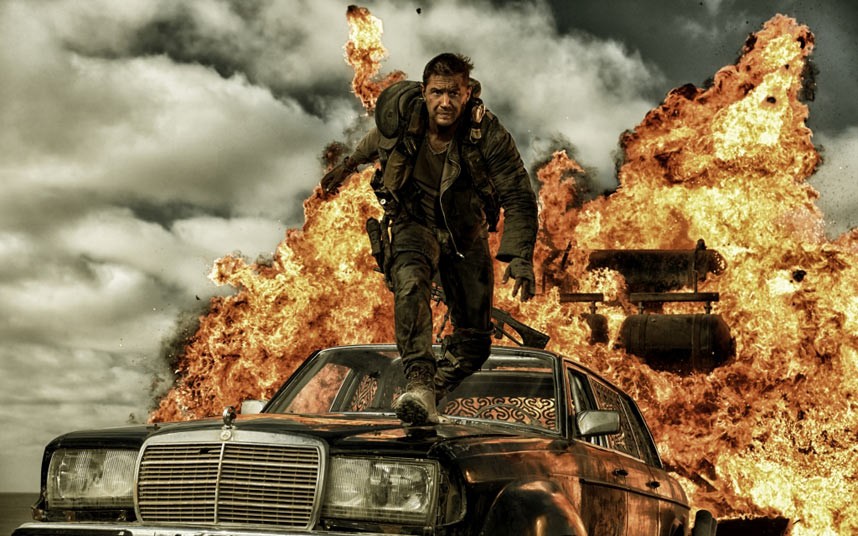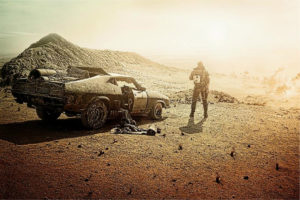By R. Brownell
Disclaimer: does contain some spoilers of the film!
Life, Anarchy, and Fury Road
A world struggling in the aftermath of a war long forgotten, in a wasteland that breeds a worldview of resignation; the newest addition to the cult classic film series Mad Max, titled “Mad Max: Fury Road”, pits the film’s hero Max Rockatansky (Tom Hardy) against a violent cult-like gang, born in the ashes of the dystopian wasteland located in the outback of Australia.
The film shows a fictional scenario of a world which has spiraled into anarchy, a world free of the constraints of government, but not free of violent aggression put forth by sinister bands of purely despotic people. This post-apocalyptic reality devised by franchise creator and director George Miller, shows the fallacy of anarchism with a flair of theatrics in a way which makes members of the audience truly ask themselves whether or not the they could survive on their own if faced with the challenges and danger Max and his cohorts are forced to encounter.
Who Killed the World?
A common phrase which echoes throughout the film, similar to that of “Who is John Galt?” from Ayn Rand’s Atlas Shrugged, is “Who killed the world?” which is uttered in more than one scene in the film by the wives of the story’s antagonist, King Immortan Joe, the leader of a vicious and ruthless gang known as the War Boys.
In the movie, constant fighting between rival gangs over land and resources (primarily gasoline) has bred generations of people whose sole focus in life is the daily survival in the harshest of desert conditions, which is dictated on how much gasoline they can scavenge in order to continue moving towards their unknown future. The question “Who killed the world?” is obvious, man killed the world, but who specifically killed the world is a question which remains unanswered, yet alluded to throughout the series.
Some evidence as to whom killed the spirit of civilized man is seen prominently at the beginning of the second Mad Max film, Mad Max 2: the Road Warrior. During the film’s opening credits, the narrator speaks of a war between the nations, where images of WWI, WWII, and the conflict in Vietnam show the constant struggle between the Allied forces and the shroud of fascism and communism. Poignantly though, the narrator shows how their alternate reality differs from our own, not citing conflicting ideology as the factor which caused their impending nuclear holocaust, instead, unrelenting and very public, nationalistic fervor over control of fossil fuels (more so than the economic warfare seen in reality), which in turn created a hostile international environment where nations began to aggressively fight over energy producing resources around the globe. Because of unknown events, nuclear and atomic bombs began to blow on every continent, and civilization began to collapse as governments around the globe pulled the trigger on humanity.
Yet, did military conflict kill the world, or was it something less tangible?
Whether you watch Fury Road or Beyond Thunderdome, something which is very clear throughout the series is that the survivors are primarily focused on day to day survival, not long term planning. Cultural pillars which characterize civilization such as markets, churches and places of organized religion, and even schools, are absent in the world of Mad Max. These social constructs that promote order and intellectual growth are left behind in the dust of the old world, now leaving a world defined by the conquest ethic of material gain obtained by brute force, as shown by the constant violence between various factions of rival gangs. Instead of trying to create new forms of energy, instead of trying to use diplomacy as a means of restoring some form of governance, the answer becomes even more visible; men in power created war, but as a result, instead of taking the opportunity to avoid and fix the mistakes of yesterday, “civilized man” decided to return to primitive nature…
Savage and power hungry man, in full embrace of anarchy killed the world.
Abandonment Of Civilization
Secondly, the film has another recurring phrase, once again spoken by the warlord’s wives, “We are not things”. Another characteristic seen in Fury Road is the treatment of those who are subjugated (primarily women) to King Immortan Joe. In the film, women serve one singular purpose, to bear children; much like livestock, his women are forced to live the in dehumanizing conditions, treated like property, and stripped of all God given rights. In this realm, the Non Aggression Principle (NAP) holds no place; individual rights are dictated by those with the heavier stick.
Joe’s wives (who wish to escape the citadel which they are held captive) show a glimmer of hope for humanity, devising a dangerous plan to escape to a place they refer to as the “Green Place”, far away from the desert wasteland where they can live in harmony. By constantly reminding themselves “We [they] are not things”, they identify that they are living beings, endowed by their creator with unalienable rights, deserving of free will and respect. This identification of their individualism shows even in the darkest corners of the world, man always yearns for liberty, something which cannot flourish in a totalitarian state, or in a world burning in the flames of anarchy.
Its a Mad, Mad World!
Fury Road succeeds in showing whether or not concentrated power is called a government, a gang, or something else, evil people will always fill the void of authority when disaster or tragedy occur all in order to obtain a monopoly of power. What the film, like every tale of the hero’s journey, is that in every corner of resignation and despair, whether it is fully realized or not, man thirsts for liberty.
RELATED: 5 Reasons I’m Not An Anarchist
Mad Max: Fury Road hits theaters nationwide May 16th








